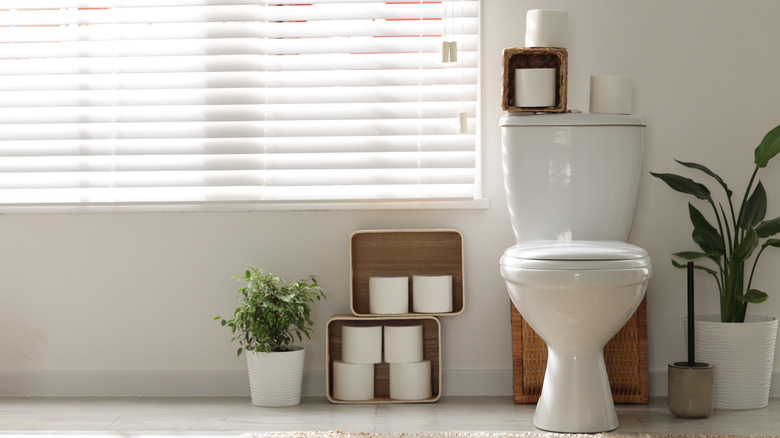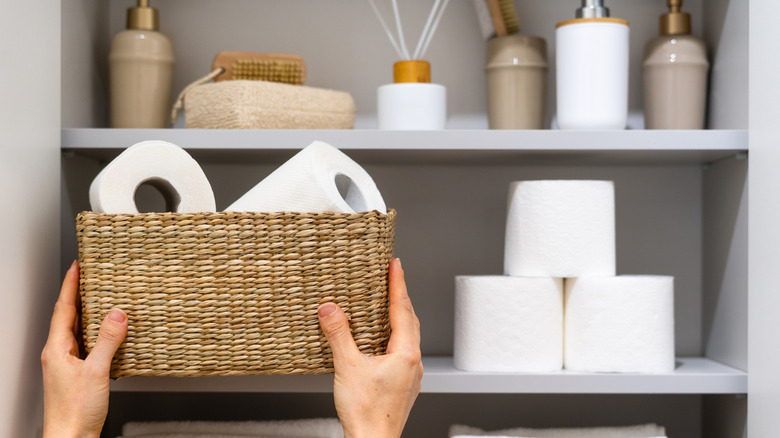The Type Of Toilet Paper Most Recommended By Our Plumbing Expert (& What To Avoid)
Talking about your toilet paper shouldn't be taboo, especially when it comes to figuring out the best brand for your plumbing. While comfort and price play into your decision, it's also a good idea to consider how certain materials will affect your pipes (the metal kind, not your digestion). It may not have even crossed your mind to refrain from using certain brands, but expert Joseph Wade, VP of Operations at Benjamin Franklin Plumbing, gave House Digest readers exclusive insight into which TP types to avoid, and which will ensure your plumbing runs smooth. According to Wade, "single-ply or thinner two-ply toilet paper is the safest bet for your plumbing and septic system, as it dissolves more quickly and reduces the risk of buildup."
When shopping for your favorite brands, it may be worth checking if the ply will dissolve at a rate that can keep up with your system's needs; otherwise, you could be stuck with buildups that cause plumbing issues. Wade followed up with his recommendation, saying, "Thick or slow-dissolving toilet paper can build up in pipes, leading to stubborn clogs and backups." While it may be comfortable for use, it isn't always the ideal choice for your home, so avoid these toilet papers if you want to keep your septic tank healthy.
Stick with brands that dissolve more quicky
Joseph Wade did give readers a little tip to use while shopping for their toilet paper. "While we don't endorse specific brands, plumbers consistently see good results with brands known for fast-dissolving formula," he exclusively told House Digest. Wade noted that Scott 1000 can work for those dwellings that tend to have issues with their septic systems since it dissolves and breaks down more efficiently than other types. "Other brands with 'rapid-dissolve' or 'septic-safe' formulas, like some options from Angel Soft or Seventh Generation, also tend to perform well." While not all name brand toilet papers will give the best bang for your buck, especially if they cause septic problems, some are still worth purchasing as they're gentle on the plumbing system.
When asked how you can determine if a type of TP will negatively affect your plumbing, Wade explained there's an easy experiment you can do. "A simple test at home is to place a few sheets of toilet paper in a jar of water, shake it for about 10 seconds, and see if it starts to break apart," he said. "If it doesn't, it might not be the best choice for your septic system." Just by trying this hack out, you could save a lot of money on plumbers and repairs.
Avoid ultra thick brands
As Joseph Wade explained during his House Digest exclusive, the problems certain types of toilet paper could cause, he added, "In homes with septic systems, improper toilet paper can cause even more trouble by disrupting the natural bacterial breakdown process inside the tank, potentially leading to expensive repairs or system failure." This shined some light on why you want to avoid picking based off brand names or thickness. He also noted that not all labels are accurate about their dissolve factors. "The term 'septic-safe' isn't heavily regulated, so it's important to look beyond the label. Some products marketed as septic-safe can still break down too slowly, especially if they're thick or heavily quilted," Wade shared .
He also advised readers on what to avoid or look out for when shopping. "I'd caution against ultra-thick or 'luxury' toilet papers — those plush, multi-ply options may feel soft, but they can be tough on pipes and slow to break down in septic tanks." You're likely to have plumbing issues if you use this type of toilet paper, which is why many experts like Wade suggest picking other brands and materials. Even products labeled as "extra strength" or "ultra-soft" can signal bad news for your plumbing system, according to Wade.


